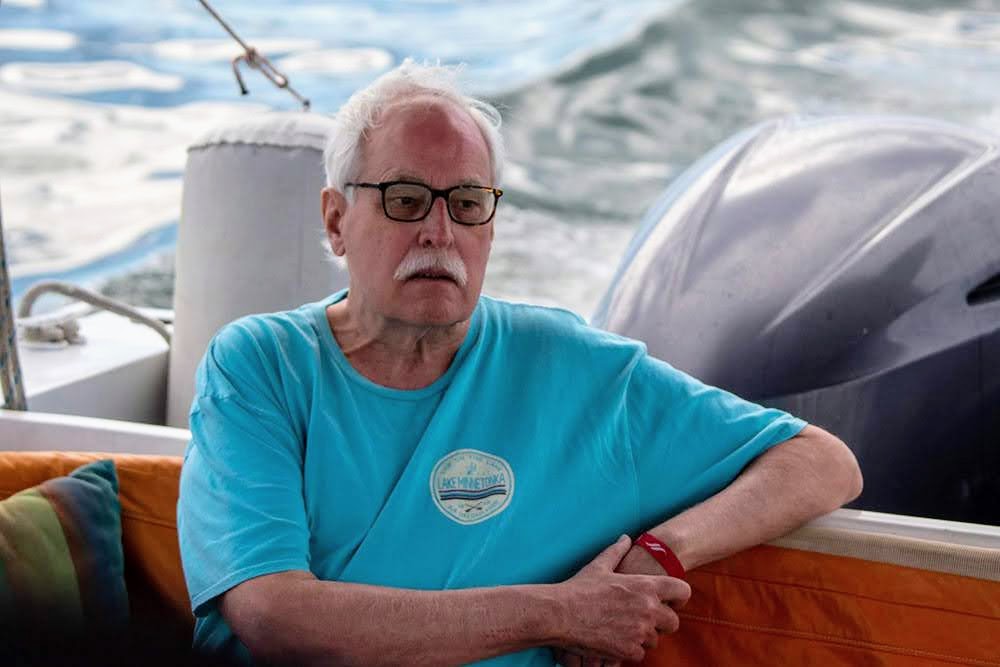
Written By: Julia Brabant
July 2023
Date of Diagnosis: September 2012
Current Status: No Signs of Active Pancreatic Cancer
How Optimism, Confidence in His Care Team Turned the Tables for 10-Year Pancreatic Cancer Survivor James “Skip” McGrane
When Appleton, Wisconsin’s James “Skip” McGrane found out he had pancreatic cancer in September 2012, he felt his only real option was to enter hospice. Yet, after speaking with psychologists at a major U.S. cancer center, he had a change of heart, realizing he did want to move forward with treatment. Now, more than 10 years later, Skip is living cancer-free – and sharing his story with the hope of helping other people with pancreatic cancer navigate their own diagnoses and develop a better understanding of their options.
Skip had virtually no symptoms leading up to his diagnosis aside from yellowing skin, which is a sign of jaundice. When his jaundice worsened over several days, he sought treatment at his local urgent care, where doctors thought he might have liver problems. They conducted a series of tests, and when the tests turned up abnormalities, the urgent care doctor recommended he go to the hospital for a CT scan.
After conducting a CT scan, doctors suspected Skip had a pancreatic tumor that was likely squeezing his bile duct, resulting in jaundice. They installed a stent into his bile duct to help relieve symptoms and recommended he go to another area hospital due to issues with health insurance.
When Skip encountered additional insurance issues at the new hospital, he went back to the drawing board. He discovered that Dr. Douglas B. Evans, one of the nation’s preeminent pancreatic cancer surgeons and researchers, was both part of his insurance network and in practice at Froedtert & The Medical College of Wisconsin, about 100 miles away from Skip’s home in Appleton.
“At this point, I’d pretty much decided that I only had about a 10% survival rate,” Skip said. “I wasn’t planning to do much aside from hospice.”
Skip noted that his brother passed away from lung cancer despite trying numerous treatment measures, and that he didn’t want to go through the same struggles just to reach a similar fate. When he went to meet with Dr. Evans and his team, though, they had him sit down with psychologists to get a better sense of his emotions and mindset.
“After talking to them for three or four days, I thought to myself – what am I doing?!” Skip said, noting that the psychologists he spoke with helped him realize maybe he did have hope, after all. Dr. Evans, too, expressed optimism at Skip’s situation, stating that his intent was to shrink the tumor with the hope of decreasing blood vessel involvement – ideally enough for Skip to have surgery.
Feeling encouraged, Skip decided to move forward with Dr. Evans’ proposed treatment plan, which included chemotherapy and radiation therapy for the time being. The treatments proved effective enough for Dr. Evans to recommend Skip have a Whipple procedure, which is an intense and difficult surgery sometimes used to remove tumors from the pancreas.
Skip had the Whipple in February 2013 and spent the days that followed recovering at Kathy’s House, an affordable, temporary housing option for patients and families who have to travel to Milwaukee for medical care. He then began chemotherapy and radiation therapy again once he regained some of his strength to help prevent a cancer recurrence.
“They were all very helpful,” Skip said, of the entire team at MCW. “These people are great at doing their jobs.”
He noted that, in addition to Dr. Evans, he credited radiation oncologist Dr. Beth Erickson, M.D., oncology specialist Dr. Paul Rich, M.D., and Dr. Evans’ now-retired nurse practitioner Beth Krzywda M.S.N., A.P.N.P., with motivating him and delivering quality, patient-centered care that helped turn his situation around.
Like many Whipple surgery survivors, Skip experiences ongoing, long-term gastrointestinal effects, but he notes that they are a “small price to pay for still being alive.” He initially took CREON, a form of pancreatic enzymes, after surgery to help with digestion, but found that the medication was expensive and only had minimal effects. He began taking other pancreatic enzymes for the same purpose but has found that they, too, only worked so much.
While it’s taken some time to adjust to the lifestyle changes brought on by the Whipple surgery, Skip has gone on to otherwise live a pretty normal life. He began having follow-up visits with his care team every three months, and when all follow-up tests were clear, he began spacing the visits out to every six months, and then once a year.
“They were very good about following up – they eventually cut me loose about three years ago,” Skip said, noting that he no longer has regular follow-ups, but that doctors told him to get back in touch if anything ever seems amiss. “After seven years, they consider it unlikely the cancer is going to come back.”
While Skip no longer meets with doctors on a regular basis, he did provide blood samples for use in pancreatic cancer research. In particular, he supplied samples for use in a study designed to assess the effectiveness of having chemotherapy and radiation therapy before surgery, as opposed to having surgery without trying these measures first. He noted that this study was of particular importance to him as the first hospital he visited, post-diagnosis, recommended he dive straight into surgery before undergoing chemo or radiation.
“In my case, it seemed to really help to get things under control through chemo and radiation,” Skip said. “I’m more than happy to participate in studies that only cost me a few more vials of blood.”
While Skip believes having chemo and radiation ahead of his surgery helped him recover well from it and remain cancer-free after it, he also credits his care team with his positive outcome.
“A large part of it was what the MCW team did in keeping me well-informed and uplifted,” he said. “I really didn’t come into the surgery super healthy; I was just a lucky boy who got great treatment, great advice and great moral support.”
Skip also said he felt encouraged by Dr. Evans’ positive outlook, recalling that Dr. Evans told him he hoped to help get current pancreatic cancer survival rates up to 30%, and then, eventually, up to 70%.
“That outlook of optimism persuaded me to get something done,” he said. “I want to express my sincere appreciation and delight in the team and protocols that Dr. Evans put in place. Together, they really saved my life, and what more can I ask for?”
Skip has shown no signs of cancer since his Whipple procedure in February 2013.


